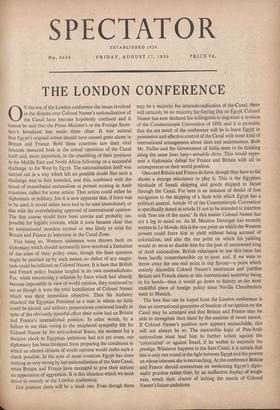THE LONDON CONFERENCE
0 N the eve of the London conference the issues involved in the dispute over Colonel Nasser's nationalisation of the Canal have become hopelessly confused and it cannot be said that the Prime Minister's or the Foreign Secre- tary's broadcast has made them clear. It was natural that Egypt's original action should have caused great alarm in Britain and France. Both these countries saw their vital interests menaced both in the actual operation of the Canal itself and, more important, in the crumbling of their positions in the Middle East and North Africa following on a successful challenge to the West by Egypt. The nationalisation itself was carried out in a way which left no possible doubt that such a challenge was in fact intended, and this, combined with the mood of exacerbated nationalism at present existing in Arab Countries, called for some action. That action could either be diplomatic or military, but it is now apparent that, if force was to be used, it would either have had to be used immediately or else with the overwhelming approval of international opinion. The first course would have been unwise and probably im- possible for logistic reasons, while it soon became clear that no international mandate existed or was likely to exist for Britain and France to intervene in the Canal Zone.
This being so, Western statesmen were thrown back on diplomacy which should necessarily have involved a limitation of the aims of their policy since, though the Suez question might be patched up by such means, no defeat of any magni- tude could be inflicted on Colonel Nasser. It is here that British and French policy became tangled in its own contradictions. For, while renouncing a solution by force which had already become impossible in view of world opinion, they continued to act as though it were the total humiliation of Colonel Nasser which was their immediate objective. Thus Sir Anthony attacked the Egyptian President as a man in whom no faith could be placed, and military preparations continued loudly in spite of the obviously harmful effect their noise had on Britain and France's international position. In other words, by a failure to see that, owing to the misplaced sympathy felt for Colonel Nasser by the anti-colonial States, the moment for a decisive check to Egyptian ambitions had not yet come, our diplomacy has been hindered from preparing the conditions in which an altered climate of world opinion would make such a check possible. In the eyes of most countries Egypt has done nothing so very wrong by her nationalisation of the Suez Canal, while Britain and France have managed to give their actions an appearance of aggression. It is this situation which we must strive to remedy at the London conference.
Our position there will be a weak one. Even though there may be a majority for internationalisation of thesCanal, there will certainly be no majority for forcing this on Egypt. Colonel Nasser has now declared his willingness to negotiate a revision of the Constantinople Convention of 1888, and it is probable that the net result of the conference will be to leave Egypt in possession and effective control of the Canal with some kind of international arrangement about dues and maintenance. Both Mr. Dulles and the Government of India seem to be thinking along the same lines here—mirabile dicta. This would repre- sent a diplomatic defeat for France and Britain with all its consequences on their world position.
One card Britain and France do have, though they have so far shown a strange reluctance to play it. This is the Egyptian blockade of Israeli shipping and goods shipped to Israel through the Canal. For here is an instance of denial of free navigation to the shipping of a State with which Egypt has a political quarrel. Article 10 of the Constantinople Convention is specifically stated in article 11 not to be intended to interfere with 'free use of the canal.' In this matter Colonel Nasser has not a leg to stand on. As M. Maurice Duverger has recently written in Le Monde, this is the one point on which the Western powers could force him to yield without being accused of colonialism, and also the one point on which his yielding would do most to disable him for the post of uncrowned king of Arab nationalism. British reluctance to use this issue has been hardly comprehensible up to now; and, if we were to throw away the one real point in our favour—a point which entirely discredits Colonel Nasser's assurances and justifies British and French alarm at this international waterway being in his hands—then it would go down to history as the most unskilful piece of foreign policy since Neville Chamberlain went to Munich.
The best that can be hoped from the London conference is that an international guarantee of freedom of navigation on the Canal may be arranged and that Britain and France may be able to strengthen their hand by the exercise of sweet reason. If Colonel Nasser's position now appears unassailable, this will not always be so. The inexorable logic of Pan-Arab nationalism must lead him to further action against the `colonialists' or against Israel, if he wishes to maintain his prestige. Whatever happens to the Suez Canal, it is certain that this is only one round in the fight between Egypt and the powers' on whose interests she is encroaching. At the conference Britain and France should concentrate on weakening Egypt's diplo- matic position rather than, by an ineffective display of tough- ness, wreck their chance of halting the march of Colonel Nasser's future ambitions.


































 Previous page
Previous page